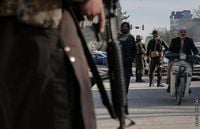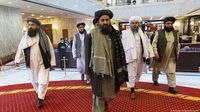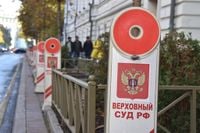On April 17, 2025, the Supreme Court of the Russian Federation made a significant ruling by suspending the ban on the activities of the Taliban movement within Russia. This decision comes in light of a lawsuit filed by the Prosecutor General, Igor Krasnov, who requested the court to reconsider the status of the Taliban, which has been classified as a terrorist organization in Russia since 2003.
The court's decision was announced during a closed hearing led by Judge Oleg Nefedov. According to lawyer Alexander Molokhov, who represented the Taliban in the case, the court officially excluded the movement from the register of terrorist organizations, a move that has raised eyebrows and sparked discussions across various sectors of society.
The legal groundwork for this ruling stems from a decree signed by President Vladimir Putin in December 2024, which established a new procedure for removing organizations from the list of banned terrorist entities in Russia. This law allows the court to suspend the ban on a terrorist organization if it is determined that the organization has ceased its activities related to propaganda, justification, and support for terrorism.
In the context of the Taliban's history, it is important to note that the group seized power in Afghanistan in August 2021 following the withdrawal of American troops. Since then, representatives of the Taliban have been visiting Russia regularly, and President Putin has referred to the movement as an ally in the fight against terrorism.
Prior to this ruling, the Taliban had been subject to a strict ban, which was implemented in response to its actions and affiliations with terrorism. However, the recent changes in legal policy reflect a shift in the Russian government's approach to dealing with the Taliban, as well as the evolving geopolitical landscape.
On March 31, 2025, the Prosecutor General filed the lawsuit requesting the suspension of the ban, which has now been granted. This request came nearly a year after the Russian Foreign Ministry and the Ministry of Justice had previously approached President Putin with a similar proposal in May 2024.
During the court proceedings, the legal representatives argued that the Taliban had ceased its activities that could be classified as terrorist in nature, thereby justifying the request for the ban to be lifted. The court ultimately agreed, stating that there was sufficient evidence to support the claims presented by the Prosecutor General's office.
The implications of this ruling are profound, as it not only alters the legal status of the Taliban in Russia but also raises questions about the future of international relations and counterterrorism strategies. The Taliban's recognition as a potential partner in combating terrorism could signal a shift in how Russia engages with radical groups that were once considered adversaries.
As this decision takes effect, it is expected that the Taliban will formally be removed from Russia's list of terrorist organizations, allowing it to operate within the country under specific legal conditions. The ruling has been described as a landmark moment in Russian legal history, particularly in how it pertains to the classification and treatment of organizations previously deemed as threats to national security.
Critics of the ruling argue that this could embolden the Taliban and other similar groups, potentially undermining efforts to combat terrorism both domestically and internationally. Supporters, however, see it as a pragmatic approach to a complex geopolitical issue, emphasizing the need for dialogue and cooperation over isolation.
In conclusion, the Supreme Court's decision to suspend the ban on the Taliban marks a pivotal point in Russia's approach to terrorism and international relations. As the situation develops, it will be crucial to monitor the actions of the Taliban and the Russian government's strategies in engaging with this controversial movement.








